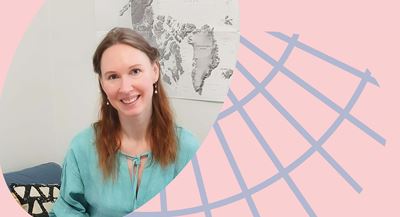
Is UArctic so impactful that it can build the foundation for an entire career? It can for many people, including myself!
By Anastasia Emelyanova, Vice-lead of the UArctic Thematic Network on Health and Wellbeing in the Arctic, Post-doctoral Researcher, Thule Institute, University of Oulu
I am a Postdoctoral Researcher at the Thule Institute of the University of Oulu, Vice-Lead of the UArctic Thematic Network on Health and Well-being in the Arctic, and Arctic Five Chair in Healthy Ageing and One Health.
UArctic is about education. According to the recently released “Report on graduate education conducted by UArctic Thematic Networks during 2005-2021”, almost 11,000 students from 67 different nations have benefited from its courses. I am one of the students graduated from the UArctic Thematic Network guided programs. With a drive to learn more about the Circumpolar North, excellent coordination, supervision, and the thought “a perfect thesis is never finished, and a finished thesis is never perfect,” in 2010 I became the first graduate of the (at that time) new Master’s degree program Health and Well-being in the Circumpolar Area and in 2015 the first graduate of the PhD program with a degree in Arctic Health from the University of Oulu.
I chose these two UArctic programs, because they were flexible enough to study and gain work experience at the same time. They also expanded my views and perspectives about the Arctic issues in a condensed way through multiple summer and PhD courses across the Arctic and in Europe, all counted as part of my curricula. I was very privileged to travel and network so much while preparing my thesis and hence building the platform to continue with the post-doc life. I learned that the Arctic is very diverse and different and not homogeneous in all kinds of issues. I learned about Arctic health from a perspective that took into account scientific, Indigenous, and One Health approaches.
The networking and collaborative approach, absorbed from the UArctic community values during studies at the Master’s and PhD levels, helped find my own place in the highly competitive academia market afterwards. My work had created enough trust to be invited for a leadership role in the Thematic Network on Health and Well-being in the Arctic, and for member/researcher involvement in the Thematic Network on Ageing and Gender in the Arctic, which I am very excited about. As part of the leadership of the Thematic Network, we try to engage our members in meaningful training about Arctic health, project collaboration, matchmaking, and representing Arctic health in various national and international bodies and unions. We have quite a relaxed and friendly atmosphere, and it is a lot of fun to regularly meet and discuss how we succeeded so far, how we go forward, and what new activities we can do together. We also feel part of a much bigger family of Thematic Network leads.
Another leadership role I hold – Arctic Five Chair in Healthy Ageing and One Health – is run by a different network umbrella, Arctic Five, but it follows the same values that are promoted by UArctic, and in many ways involves also persons from UArctic institutions and Thematic Networks. This position only started in June 2022, but it has so far allowed me to create several networks with senior experts in e.g. population studies, human health, domestic animal and wildlife health, as well as with ecosystem health scientists with whom we also applied for joint funding. In one network, we promote the One Health approach, because human health, animal health, and ecosystem health are interrelated and interdependent in complex ways. This perspective is prudent at a time when Arctic residents face the complex challenges associated with global climatic and environmental changes. In another network, we address a demographic megatrend of the Arctic – population ageing – and investigate what the current Nordic policies are, and what is needed to create a safer outdoor environment and public spaces for older citizens in the Nordic Arctic. I hope that many publications, joint projects, discussions, and even something as ambitious as the first conference/meeting to discuss Indigenous ageing futures in the Arctic will be the result of me serving in this position.
I am also lucky to be part of two administrative bodies of UArctic. The first one is the Thematic Networks and Research Liaison Office, hosted by the University of Oulu, that integrates the Thematic Networks and Institutes with UArctic members and creates synergies in research and education. Another one is the circumpolar Information Team of UArctic that runs the organization's information and communication services. Both teams feel utterly innovative and dynamic with fresh spirit and new ideas where we learn about various tools, programs, and ways to engage the UArctic community and general public. I would like to find more time to be engaged and contribute even more into the fascinating work these two teams are doing.
A little bit of kindness and respect towards work-life balance goes a long way. Being a mom of two small kids (currently four and one year old), I have received a lot of support and understanding from my colleagues to make it possible to combine a job and much increased family demands. With the appreciation I feel from my co-workers’ network, there is nothing that cannot be done in future endeavors, hopefully together with UArctic for many years ahead.